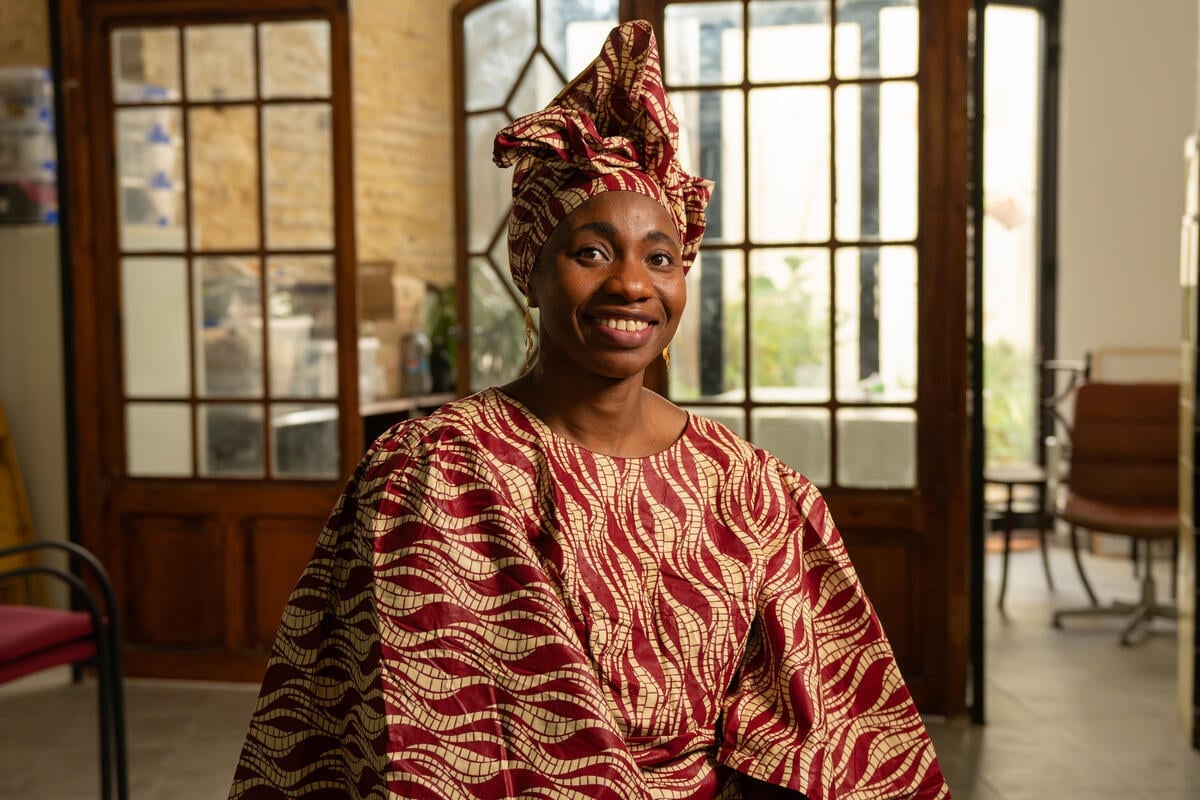Supporting one another, survivors of sexual violence in northern Mozambique begin to heal

Supporting one another, survivors of sexual violence in northern Mozambique begin to heal
Rose was subjected to gender-based violence by armed men as she fled attacks with her youngest daughter.
“It is so encouraging and uplifting to see that the women’s resilience comes from solidarity among themselves,” said Josefina Cheia, a gender-based violence officer for UNHCR, the UN Refugee Agency, who was herself displaced during an attack on her home city four years ago.
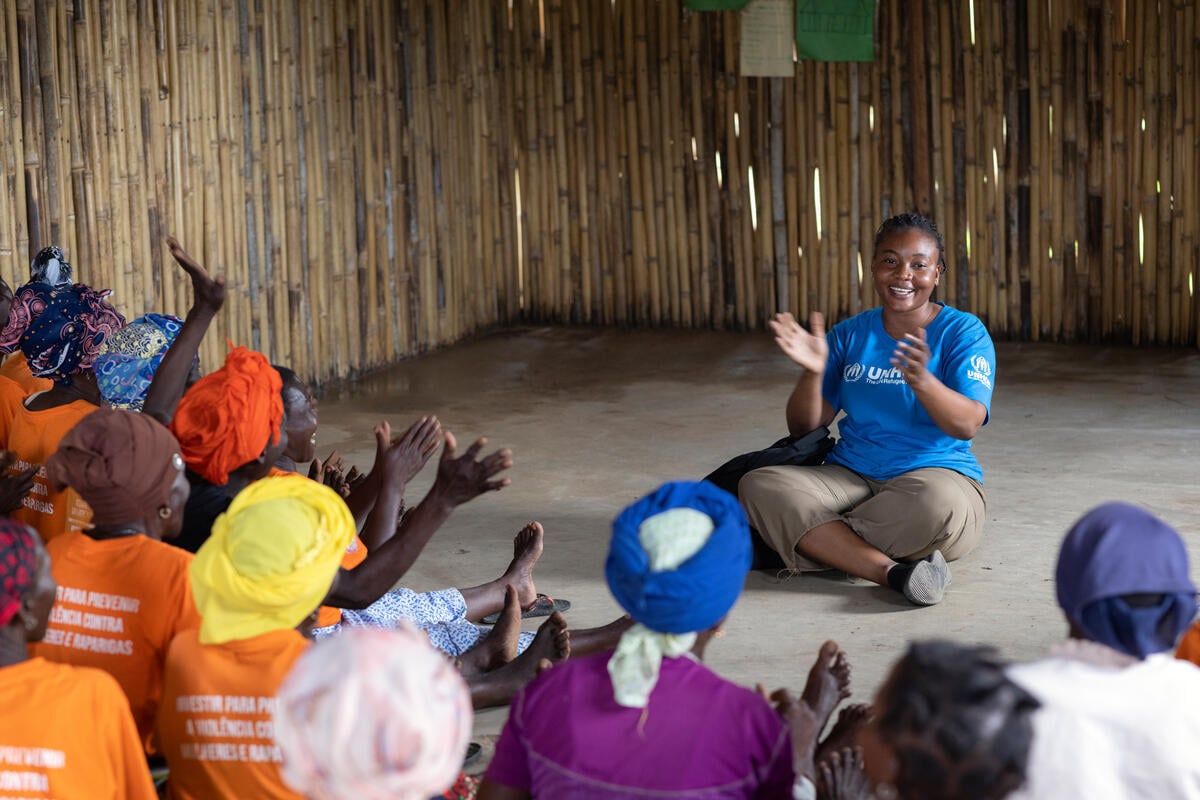
Josefina Cheia, a UNHCR gender-based violence officer, leads a group session with displaced women at a protection and community centre in Cabo Delgado Province.
Since 2017, non-state armed groups in Cabo Delgado have raided and burned villages and invaded towns, stolen property and livestock, killed civilians, forcibly recruited boys and young men, and kidnapped and raped women and girls.
One in three women worldwide have experienced gender-based violence, according to the UN, but in conflict situations such as in Cabo Delgado, the figure is believed to be much higher. “This crisis has really impacted women a lot,” Josefina said, adding that the hardest part of her job was hearing the stories of the survivors.
Watch the video:
'I want to live a safe life’
Maria was 27 when non-state armed groups abducted her and other women from her village and took them to a military camp where they were forced to become “wives”. Even girls as young as 10 years old were forced into marriage, she said.
Maria was subjected to sexual violence and brutal beatings and made to carry out domestic chores for months until her insurgent “husband” grew tired of her and sold her to another fighter for 50 meticals (less than $1). “I was later sold a second time to another man,” she said.
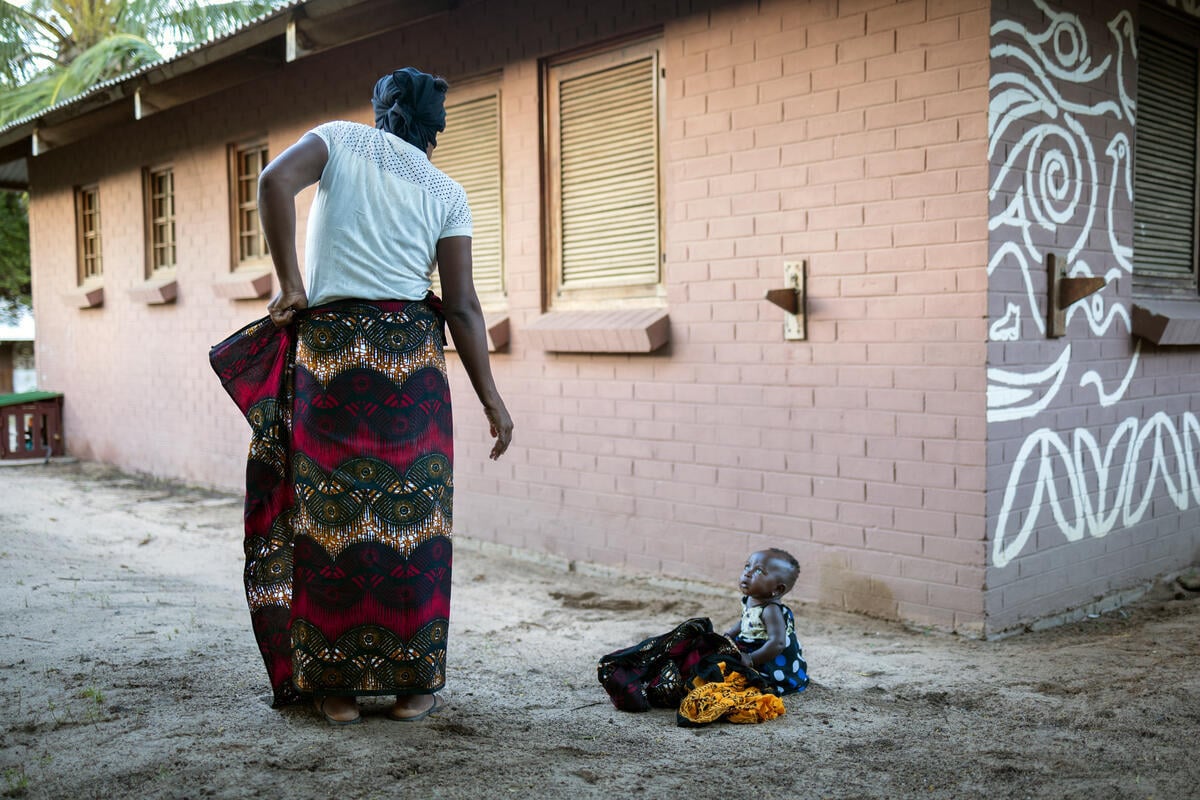
Maria adjusts her capulana – a traditional piece of cloth often worn as a skirt – while her six-month old baby girl looks on.
At a protection and community centre, she meets regularly with other women and has undertaken a livelihood and business training course, run by UNHCR partner Doctors with Africa CUAMM, which has enabled her to set up businesses selling dried fish and home-baked cakes.
Reunited with her husband, Maria recently gave birth to their second child and the family dreams of returning to her village when the conflict ends. “Home is home,” she said. “I want to live a safe life with my family.”
'I know I am very lucky’
Tausi, 33, was woken at 5 a.m. by screams, then footsteps, voices and banging on her door. Grabbing her 9-year-old daughter, she slipped out and hid beneath a palm tree from where she could see thick plumes of smoke rising over the neighbourhood as armed groups launched a deadly offensive to take control of her town.
Five members of a non-state armed group soon found Tausi and her daughter and rounded them up with other women and children. “I felt panic, sadness, and pain when they abducted us. I kept thinking of ways to make sure we both survived,” Tausi said.
The captives were taken to a small base outside the city where Tausi was to spend two years. “During that time, I was raped repeatedly,” she said.

Tausi at her home in northern Mozambique.
Like Maria, Tausi was forced to become a ‘wife’: “I became his domestic servant, his sex slave.” Women who refused were starved, tortured or killed. “We suffered things that no human being should ever have to endure,” Tausi said.
She was constantly planning an escape for her and her daughter, and when the opportunity came, she seized it.
Tausi returned home and was reunited with her husband, but the trauma of her years in captivity remains, made sharper because the perpetrators have not been held to account.
Many of them have simply returned to their old lives and sometimes Tausi encounters them in town. “We see them at the market, buying fish,” she said. “It is very difficult to accept.”
"We suffered things that no human being should have to endure."
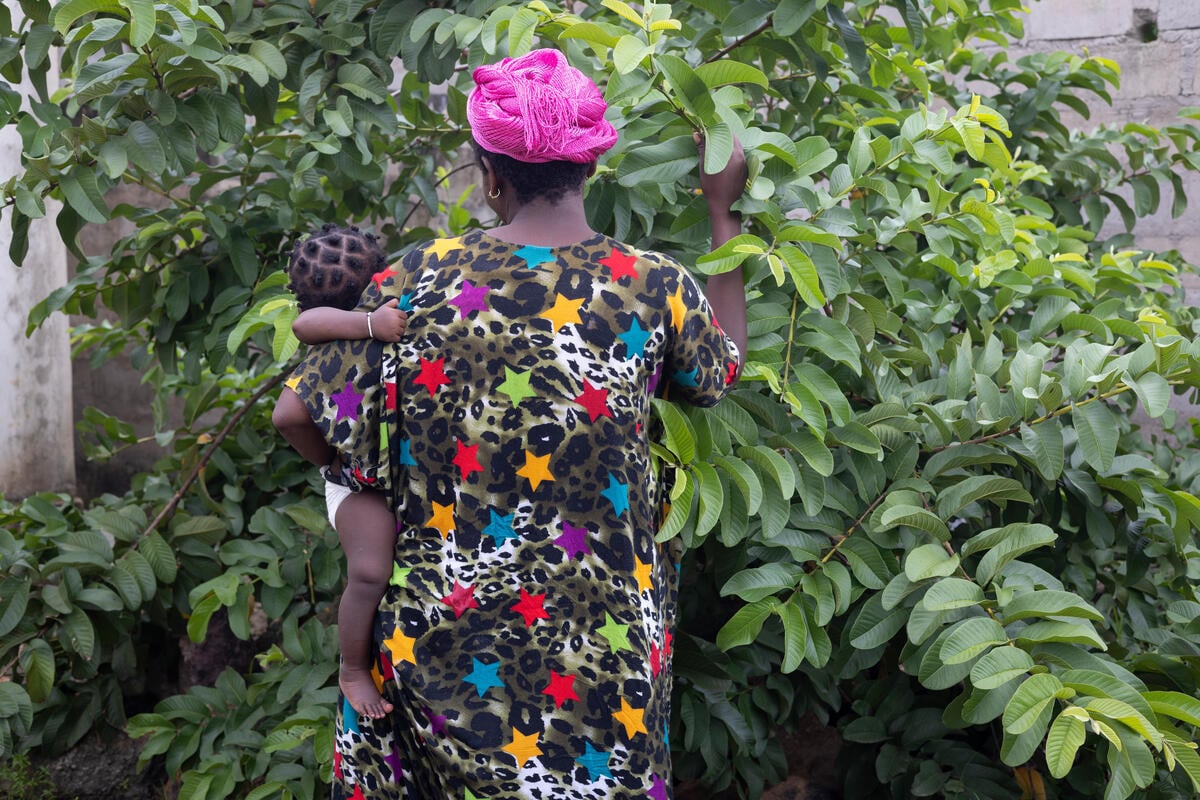
Tausi with her second child.
Nevertheless, Tausi has managed to rebuild her life with her husband. She feels glad because many of the survivors in the community have been shunned by their husbands, while Tausi has overcome the stigma surrounding violence against women, and her ordeal has strengthened her relationship with her husband: recently they decided to have a second child. “I know I am very lucky,” she said.
'My children give me strength’
When non-state armed groups began attacking nearby villages, Rose, 45, and her neighbours fled, fearing they would be next. She escaped with her six children but, in the chaos, she became separated from all but her youngest daughter, whose hand she clutched tightly. “We ran for kilometres. But even the bush was not safe,” she said.
They soon came across a group of armed men patrolling the area, but instead of helping the women, they raped them.
“They told us they needed to check that we were not involved with the insurgents,” Rose said. “They ripped our clothes. They stripped us naked and physically beat us, mercilessly. They raped us. All in front of my daughter. Once they were done with us, we ran away naked and exposed.”
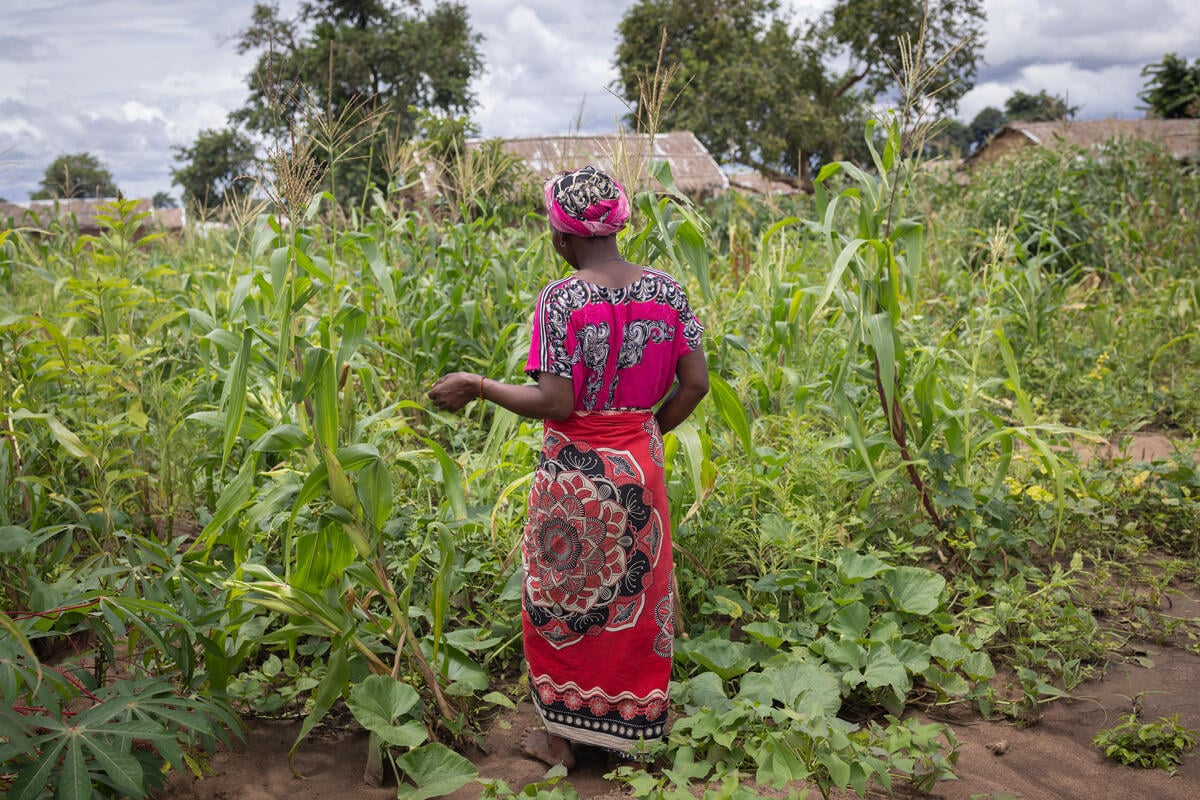
Rose near her home in a settlement for internally displaced people.
Rose found her children and husband and sought refuge in a site for internally displaced people. But when Rose’s husband learned what had happened, he was furious, blaming her for what she had suffered. He eventually abandoned his family, leaving Rose to care for their children alone.
With the support of UNHCR partner Helpcode, Rose has learned new livelihood skills at one of the protection and community centres and is becoming financially independent. “I go every day to my small plot of land near the settlement. I grow peanuts that I sell. I also have my little soap business,” she said.
“I try to move on for my children; they are the ones who give me strength. They are the reason why I continue to live.”
Healing and empowering
“My work is inspired by my experiences,” said UNHCR’s Josefina, who leads the gatherings of women at the protection and community centres throughout Cabo Delgado where they share their experiences – as well as plans for the future – helping to create an environment where they can heal and empower one another.
“It’s always been my dream, my goal, to help women who have suffered displacement and sexual violence,” said Josefina. “I show them where they can find support, I teach them that they can still have hope for their lives.”
"I try to move on for my children."
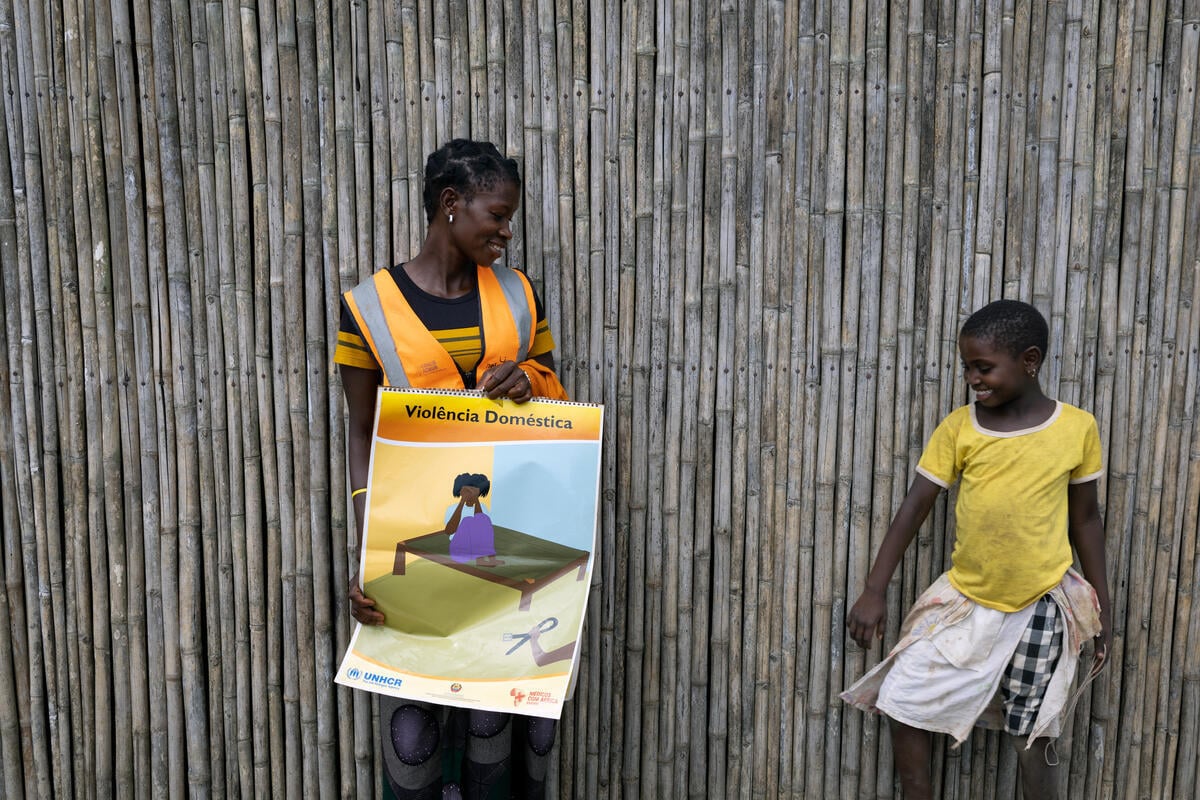
A community volunteer raises awareness about domestic and gender-based violence at a site for internally displaced people.
The centres are safe spaces where UNHCR and partners provide displaced women like Maria, Tausi and Rose with psychosocial support, legal advice, and business and livelihood training.
Female community volunteers also play a crucial role in supporting women and girls, going door-to-door to build relationships, raise awareness of the risks of gender-based violence and where to access services. “Our work makes a big difference,” said community volunteer Anastacia, 29. “Some people have never heard of ‘gender-based violence’. We are here to teach them. We tell them that it is not normal.”
‘Enough is enough’
At the height of the conflict in Cabo Delgado, in 2021 and 2022, over one million people were forced to flee their homes; today, around 580,000 remain displaced in the province, most of them women and children, and attacks persist, primarily targeting civilians.
For the survivors of gender-based violence, safety and justice remain elusive, but women and girls are finding strength in solidarity with other women. With the support of UNHCR, community volunteers and UNHCR partners, they are fighting stigma and discrimination, broadening their skills and access to opportunities, and rebuilding their lives.
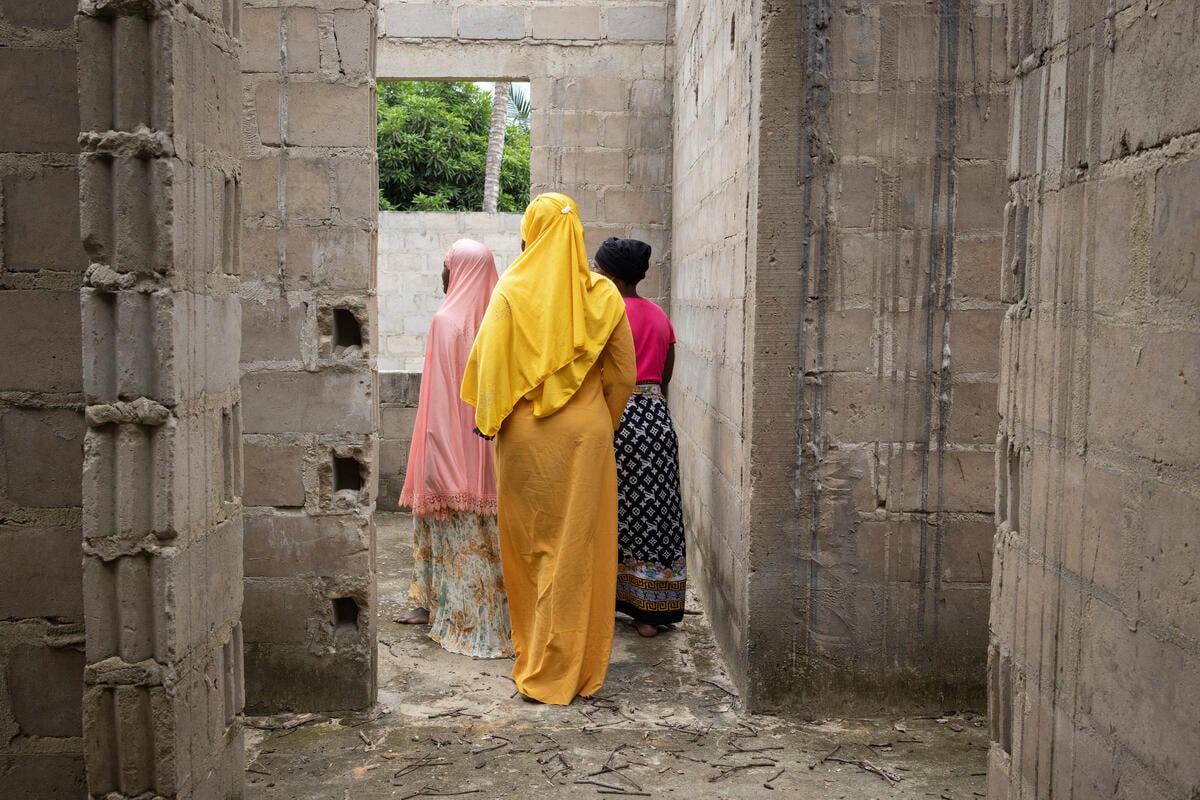
Women walk through an abandoned building in northern Mozambique. They were abducted by non-state armed groups in 2020 and held captive in their military bases for several years.
“During my displacement, I received a lot of support from many of the women, so it was my goal to do the same,” Josefina said. “It is a glimmer of hope [for other women] to see a person like me who is from Cabo Delgado, a woman, a mother, who was also displaced, and was able to stand out and be increasingly strong, to be able to fight for them.”
Helping survivors regain “their power, their dignity and hope for their future” is her greatest accomplishment, said Josefina. “Violence against women has to stop. Enough is enough.”
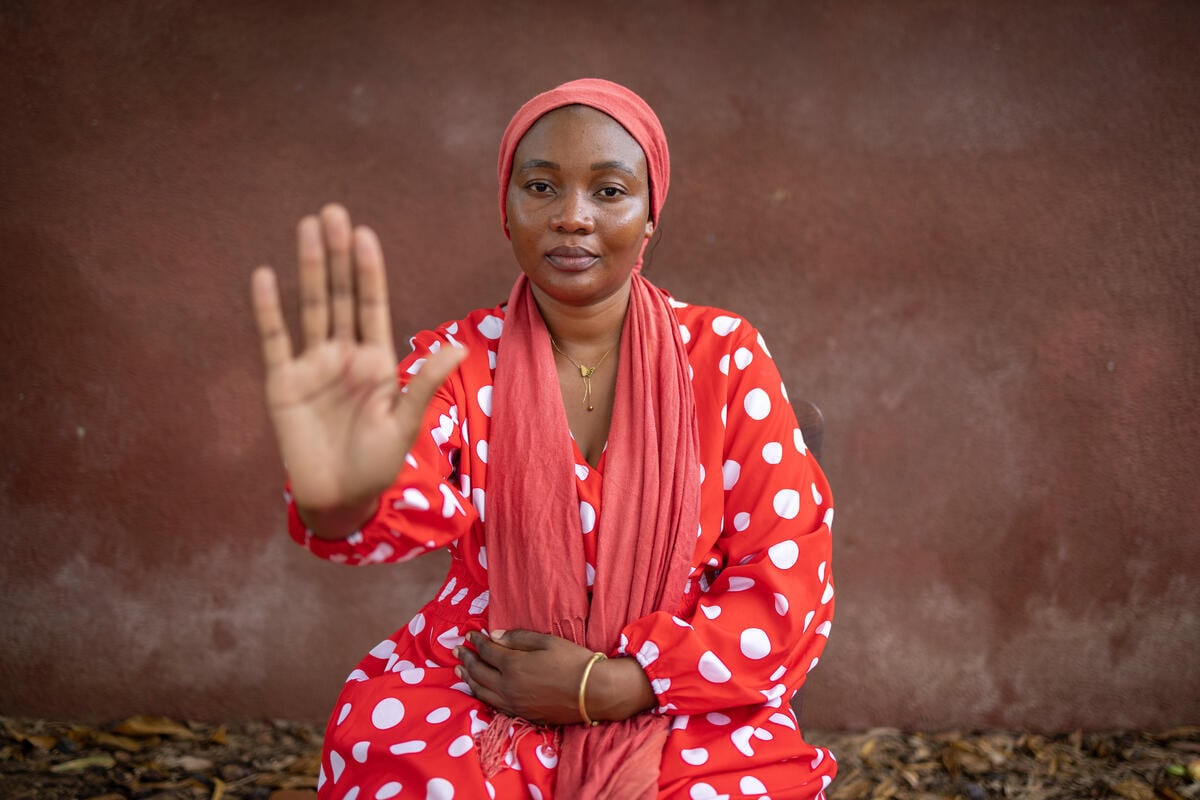
Josefina Cheia displays the hand gesture that means “stop violence against women and girls”.
To report this story, women’s empowerment groups in Cabo Delgado were informed and volunteers offered to share their stories. Names of survivors of gender-based violence were changed to protect their identities and survivors were consulted and involved throughout the production process.
“Violence against women has to stop.”







